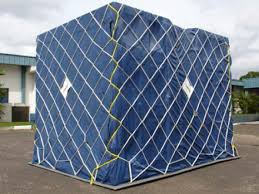
Virgin Atlantic Cargo to use lightweight cargo nets to achieve CO2 emissions reduction
SEP 11, 2015: Virgin Atlantic Cargo is to start using lightweight air cargo nets with Dyneema® as part of its ongoing contribution towards the airline’s target of reducing aircraft CO2 emissions by 30% by 2020. The airline has initially ordered 600 of the nets, which at nine kilos each represent a four kilos saving on […]

SEP 11, 2015: Virgin Atlantic Cargo is to start using lightweight air cargo nets with Dyneema® as part of its ongoing contribution towards the airline’s target of reducing aircraft CO2 emissions by 30% by 2020.
The airline has initially ordered 600 of the nets, which at nine kilos each represent a four kilos saving on the weight of a traditional cargo net used to secure shipments on pallets. The nets are also designed to be highly durable and have a five-year operating life compared to an average 2-3 years for conventional nets.
Paul Fallon, Vice President – Cargo Operations & Business Development at Virgin Atlantic, said: “The airline has a very proactive sustainability programme with clear goals and we are continually looking to meet our contribution to these targets. Last year we took delivery of our first lightweight cargo containers and using lightweight nets is another opportunity for us to reduce emissions. We expect to have some 1,800 of these nets in use by the end of 2015. We are also looking at the latest lightweight pallets that have come onto the market and expect to trial these to measure the benefits they can offer too.”
Linda Rutten, Marketing Manager Aviation at DSM Dyneema, said: “We are proud to be able to support Virgin Atlantic Cargo’s sustainability efforts by cooperating on durable lightweight solutions that truly make a difference. Using air cargo nets made with Dyneema® has clear benefits extending from increased aircraft fuel efficiency and hence fewer emissions.”
Virgin Atlantic Cargo has already invested in more than 1,100 lightweight LD3 containers as part of a programme to phase out 3,200 heavier air cargo units. The new containers are 16 kilos lighter than the old LD3s they have replaced. Every extra gram of weight onboard an aircraft means more fuel use and more emissions. Replacing old, heavier cargo bins and pallets with lighter ones will save around 2,000 tonnes in CO2 emissions.

